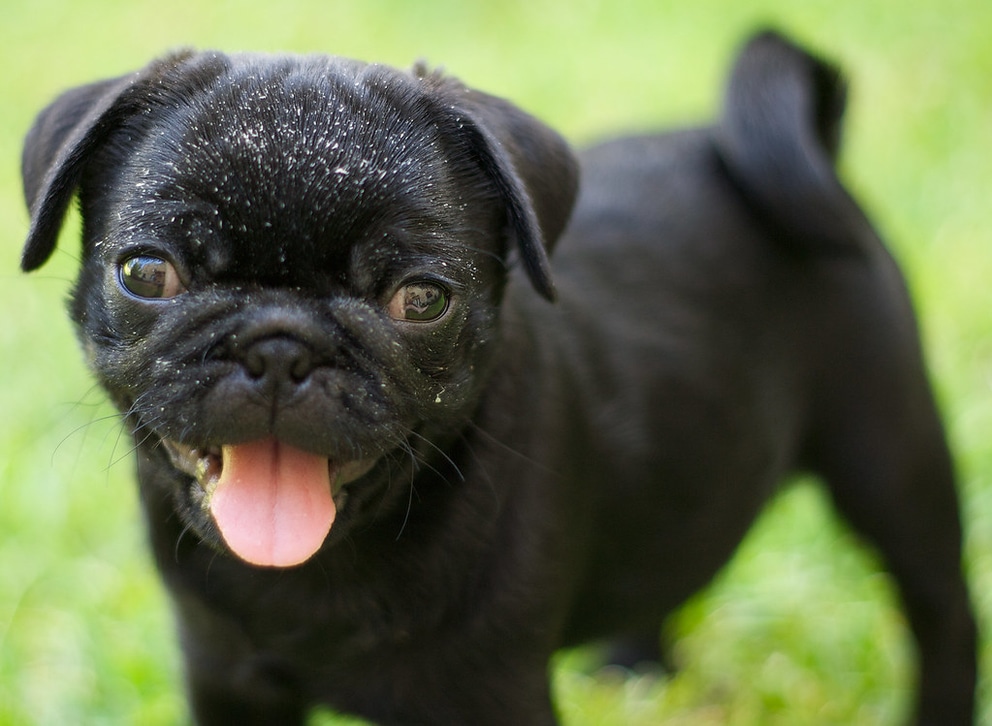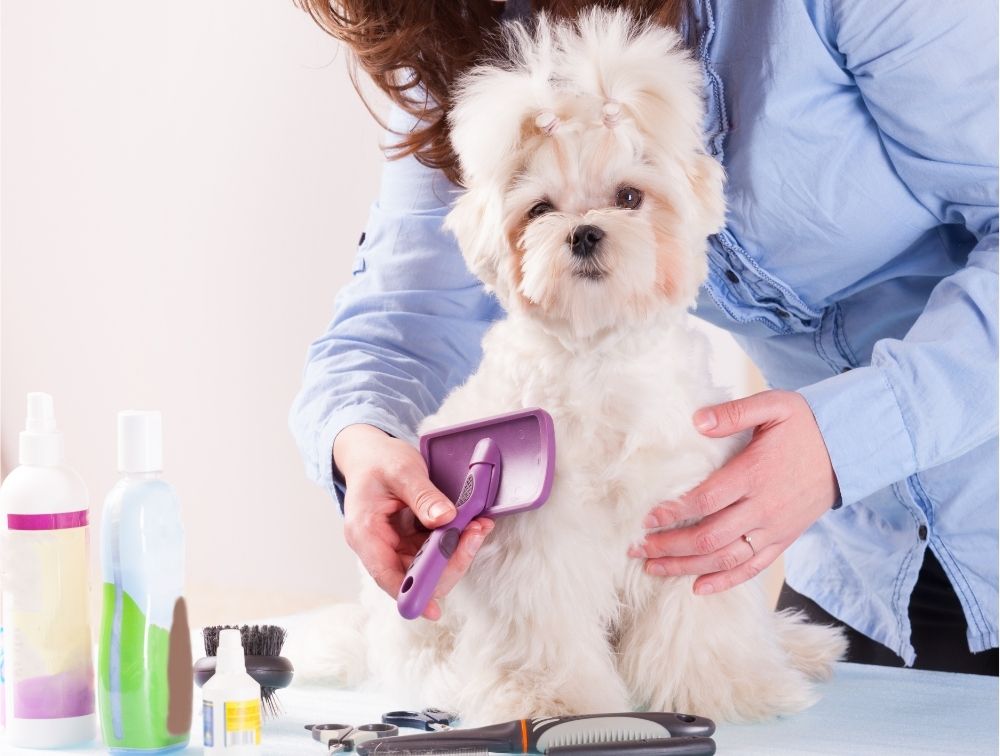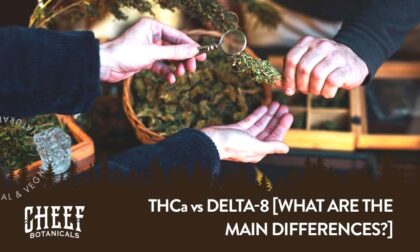Dog Dandruff: Why It Happens and What You Can Do
Many people are familiar with spotting those pesky white flakes on the neckline of a dark shirt. It’s called dandruff, and did you know that dogs can get it too? Dog dandruff is surprisingly common, and it can be uncomfortable for your pup. It can also be a little icky if you want your dog to sleep in your bed. So what can you do to help your poor pooch?
There are a lot of reasons dogs develop dandruff, from underlying health conditions to nervous behaviors. It’s important to pinpoint why your dog has dandruff to find an appropriate solution. There are a few things you can do at home to comfort your dog and improve its condition.
What is Dandruff?
The short answer: Annoying! Those white specks you see on your shirt or in your hair? That’s dandruff. It’s dry flakes made up of dead skin cells that have fallen off the scalp or body. From there, it gets caught in your hair or makes its way to your shirt. You might also see them on your pillow.

Can Dogs Get Dandruff?
Just like us, dogs can also develop dandruff. The dry skin will get caught in their coat or wind up in their favorite sleeping spot. Sometimes it can be harder to see dandruff on your dog depending on its coat color, so always check their bed, kennel, or the couch after they get up.
Dogs can develop dandruff for various reasons, all of which lead back to their skin and coat condition. Sometimes it’s caused by the environment. Other times medical conditions. The issue may even be due to their own behavior.
Your dog’s skin has something called sebaceous glands. These produce sebum, an oil that keeps the skin moist and flexible. When the glands produce too much sebum, your dog’s skin will become imbalanced. Your dog’s skin might become too dry or oily (or both).
Even though dandruff is a common side effect of many different things, dandruff isn’t healthy and should be addressed. Luckily, once you determine why your dog has dandruff, you can easily figure out a treatment path with your vet.
What Causes Dog Dandruff?
Dandruff is annoying, irritating, and (worst of all) pretty common. Various environmental, behavioral, and health factors play a part in your dog’s skin condition, including the development of dandruff. It’s important to figure out what’s causing your dog’s skin to flake, so let’s take a look at some of the reasons dogs can end up getting dry skin and dandruff.
Dry Air
In the winter, you might notice that your skin is cracked or ashy. Dogs can also experience dry skin due to arid air. If you live in a dry region, avoid putting a space heater near your pup. Instead, warm them with blankets if they get cold. You can also put a humidifier nearby to ensure their skin doesn’t dry out during the colder months.
Parasites
Fleas, ticks, mites, and other external parasites can irritate your dog’s skin, causing it to be very itchy, which can lead to flaking skin. Take a closer look at the flakes. It might actually be “walker dandruff,” another word for cheyletiella mites.
These parasites often look similar to white dandruff flakes. Fipronil may help a dog with these mites, but be sure to discuss this option with a veterinarian first.
Poor Diet
Always make sure that your dog has a balanced diet with high-quality food. Many cheap commercial brands won’t have the proper nutrients that keep your dog’s skin and coat healthy. Look for fatty acids like omega-3 and omega-6.
Also, keep a close eye on the amount your dog eats. If it becomes overweight, it is more prone to health conditions that can affect the skin. Talk to a vet about your dog’s specific food requirements. They might offer food for dogs with sensitive skin or allergies. They can also tell you the proper amount to feed your dog each day based on its weight, metabolism, activity level, and age.
Allergies
Speaking of allergies, if your dog is allergic to food or things in the environment (like dust or pollen), they might develop skin problems. During certain times of the year, your dog might become very itchy or get skin infections. Constant licking and scratching can increase your dog’s chance of having dry skin and dandruff.
Skin Infections
If your pooch has a skin infection, the bacteria or fungus can attack your dog’s weakened skin and worsen its condition. Their skin might become dry, flaky, and irritated. They might also develop sores, cuts, and swelling. Skin infections need to be treated immediately, and a vet will most likely provide medication.
Anxiousness
Sometimes excessive scratching or licking develops in dogs that feel anxious, bored, nervous, or scared. When a dog irritates its skin too much, those areas of the body may become dry or damaged, causing flakes to come off.
Seborrhea
Dandruff is sometimes the side effect of genetic conditions and other medical ailments. One such disease is known as seborrhea. That’s when baby skin cells travel to the surface of the body too quickly. Since they’re not fully developed, they aren’t held together properly, and pieces of the skin will flake away.
If your dog has seborrhea, you may also notice greasy, oily skin thanks to an overactive grease gland. It’s not known why dogs develop seborrhea, but it appears to be genetic.
Some breeds are more likely to get seborrhea than others, including the:
- West Highland White Terrier
- American Cocker Spaniel
- Doberman Pinscher
- English Springer Spaniel
Symptoms of Dog Dandruff
Since dog dandruff is so common, it can sometimes be hard to tell if the flakes caught in the fur are just the result of temporary dry skin or an underlying issue. Look for some of these other dandruff symptoms.
- Lots of flakes: If you notice a few flakes here and there, your dog might have just got done scratching itself. It could also be experiencing a bit of dry skin. But when you see a lot of flakes throughout your dog’s fur, it is most likely experiencing a condition that needs attention.
- Itching: It’s normal for a dog to scratch or feel itchy. But if your dog is scratching excessively, it might have skin discomfort, an infection, or worse.
- Redness: You might be able to see redness on certain areas of your dog’s skin. These areas might be infected, or it could be a side effect from excessive scratching. Either way, your dog will need medical attention.
- Discomfort: Look for a change in your dog’s behavior and activity level. If it licks a lot and appears uncomfortable, there might be a serious skin issue or medical condition. Dogs that are in pain might also become lazy and unwilling to play. Some might even skip out on dinner!
- Odor: While your dog may not smell very badly, you will possibly notice a different scent. Your dog’s skin, in particular, may smell different or stronger when they have an infection.
- Hair loss: Dogs suffering from medical conditions or skin issues will sometimes lose their fur. It may simply become dull or thin, and some dogs lose patches of fur.

Common Remedies for Dog Dandruff
Dealing with dog dandruff is surprisingly simple. First, call a trusted vet for an evaluation. It’s important to figure out exactly why your dog has dandruff. Vets will also offer medicine and treatment plans if your dog needs them to reduce symptoms.
Meanwhile, there are a lot of things you can do at home to comfort your dog and improve its condition.
Regularly Groom Your Dog
Even if your dog doesn’t shed a lot (or you don’t mind the presence of fluff around the home), regular brushing is important for your dog’s coat and skin health. Brush at least once a week to distribute the natural oils in your dog’s coat. Not only will their fur appear shinier and brighter, but the oils will be massaged into the skin.
Use CBD Shampoo
While you don’t want to over-bathe your dog (this can lead to dry skin), you should consider beneficial and safe shampoo when you do give your pup a good wash. Our recommendation? CBD shampoo!
CBD is a natural compound found in the hemp plant. It helps maintain your dog’s overall health and well-being by interacting with the receptors in their endocannabinoid system (ECS). The ECS contains all the major systems in your dog’s body, including the nervous, digestive, and immune systems. When CBD interacts with the receptors, it creates positive benefits throughout your dog’s body.
CBD is known to reduce skin blemishes and reduce the symptoms of skin conditions, especially when it’s massaged into the skin. CBD can also reduce discomfort overall, ensuring that your dog stops itching and scratching at uncomfortable areas. Another great feature of CBD is that it can calm dogs experiencing nervousness or anxiousness. This can cut down on destructive and neurotic behaviors like excessive scratching.
Our CBD shampoo is all-natural, organic, vegan, and safe for your dog’s skin. It will soothe your dog and moisturize its skin in the process! CBD is great because it works both internally and externally. Besides CBD Shampoo there are other CBD products for dogs like treats, tincture oils, and capsules. Providing your pet with CBD internally can reduce nervous tension associated with dandruff. Plus CBD oil contains omegas 3, 6, and 9, which are all beneficial for the skin. If you are interested in giving your pet CBD here is some great dosage information.
Related Article: Find CBD Dog Treats Near Me: The Smart Buyer's Guide
Oatmeal
Washing your dog with an oatmeal-based shampoo is another great alternative. Oatmeal is known to soothe the skin, reducing redness and irritation.
Use a Humidifier
Sometimes it’s what’s in the air (or not in the air) that causes your dog to have dry skin. In this case, we’re talking about humidity. Dry air is especially common during the winter months. Space heaters and other similar devices only dry out the air more. Consider installing a humidifier to increase the moisture in the air, soothing your dog’s skin, and reducing dandruff during the colder months.
Omega-3 Fatty Acids
If your dog has serious skin and coat issues, some vets might recommend adding omega-3 fatty acid supplements to its diet. This will promote better skin and coat health. Just remember to ask a veterinarian before giving your dog supplements. Most dogs get the amount they need through their regular diet.
Make Sure Your Dog Has a Proper Diet
Speaking of diet, it’s essential to ensure that your dog is getting food with the proper nutrients. This means high-quality dog food with protein, fat, carbohydrates, minerals, and vitamins. Among the most important of these are omega-3 fatty acids, Vitamin A, Vitamin E, and Vitamin C.
It would be best if you also kept an eye on how your dog reacts to chowing down. Your dog may be allergic to its current food. Food allergies can develop at any time. A veterinarian will be able to diagnose food allergies and provide alternatives for your pup.
Tips to Prevent Dog Dandruff
You may be able to prevent your dog from getting dandruff in the future if you follow these simple steps:
- Choose a proper diet.
- Make sure your dog gets plenty of water.
- Provide omega-3 fatty acid supplements if approved by a vet.
- Regularly groom your dog.
- Give your pet CBD oil on a regular basis.
- Use vet-approved flea medication and prevention.
- Don’t over-bathe your pup.
- Use soothing, safe, and beneficial shampoos.
- Use a humidifier, especially during cold, dry months.
- Don’t use a space heater near your dog’s bed.
- Always check coat for dryness, dullness, white flakes.
- Always check the skin for parasites, redness, irritation, and injuries.
- Bring your dog to the vet regularly.
Final Thoughts – Dog Dandruff
Dog dandruff is no fun. It’s itchy, scratchy, and white flakes of skin get everywhere. Sometimes your dog might even stink. While dog dandruff can be uncomfortable and frustrating for your pup, it’s a common condition that can easily be prevented and treated.
If your dog is scratching a lot, has flaky skin, or seems to be in distress, reach out to a vet. You can also soothe your pup with home remedies, including oatmeal and CBD shampoo. CBD topicals can be very beneficial to dogs with dry or sensitive skin. And who doesn’t love a nice refreshing bath?
Read Next: Hemp for Dogs: What Makes It so Beneficial for Canines?





